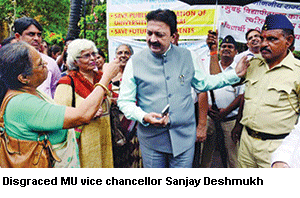 The university of mumbai (estb. 1857) continues to remain mired in the unprecedented crisis it unwittingly landed itself in, when it hastily replaced its age-old manual examination assessment system with a new online assessment system for all its 477 courses. Technological and procedural disruptions in the new system have delayed declaration of exam results to the extent that 106,963 of the 425,000 students who wrote their exams in March-May, are still awaiting their results as late as August 28.
The university of mumbai (estb. 1857) continues to remain mired in the unprecedented crisis it unwittingly landed itself in, when it hastily replaced its age-old manual examination assessment system with a new online assessment system for all its 477 courses. Technological and procedural disruptions in the new system have delayed declaration of exam results to the extent that 106,963 of the 425,000 students who wrote their exams in March-May, are still awaiting their results as late as August 28.
The varsity has declared results of 437 of the 477 undergraduate and postgraduate courses, but has publicly announced that while results for all law, and bachelor courses in arts, science and commerce will be declared by August 31, results of undergraduate distance learning programmes will be declared only in September.
Having missed several deadlines to deliver this year’s results — including the July 31 deadline set by Maharashtra governor, C.V. Rao, ex-officio chancellor of the university — results have been delayed beyond 120 days against the Maharashtra Universities Act, 1994 mandate of declaring results of any exam within 45 days. Even as the university desperately tried to expedite the assessment process, there is widespread condemnation of the varsity’s incompetent administration.
While admitting several petitions filed by students and a teachers’ union, the Mumbai high court rapped university officials. Several political and civil protests have been staged demanding the resignation of varsity vice chancellor, Sanjay Deshmukh, who is accused of unilaterally overhauling the entire system despite the university’s managing committee raising apprehensions about the switchover being completed in such a short period. With the issue monopolising the monsoon session of the Maharashtra state legislative assembly, Deshmukh was finally sent on forced leave (August 9 onwards) while Devanand Shinde, vice chancellor of Shivaji University, Kolhapur, was given additional charge of Mumbai University. The governor/chancellor also sent a show-cause notice to Deshmukh — the first ever sent to a VC in Mumbai University’s history. Replying to the notice, Deshmukh in his defence, blamed the “nexus (that benefits from assessment malpractices) of deliberately mixing-up over lakh answer papers” for causing the delay.
Examination assessment malpractices have been a constant nuisance for the university which supervises 715,000 students in 778 colleges affiliated with it. A May 2016 scandal in which answer papers were surreptitiously spirited away from the campus, tampered with and then replaced, is believed to have prompted Deshmukh’s haste to switch to the fully transparent online assessments that the university had been using to evaluate 200,000 engineering stream exam scripts since 2013. However, in the rush to launch the online system, the varsity over-optimistically believed it could assess 1.75 million answer scripts just as easily as it did 200,000 engineering papers.
Nevertheless the consequence of exam results delays is that a large number of students, especially those who had applied for admission to universities abroad or in other institutes within the country for higher studies, have already lost a year, since they were unable to submit their results in the first week of August. After much commotion on the issue, the varsity finally set up a 10-member helpdesk which tracks the answer scripts of students who have signed up for postgrad programmes, ensures they are assessed and mails the results directly to the university students have applied to. More than 1,200 such results have been directly mailed.
“The Maharashtra government has directed Mumbai University to communicate its delay in declaring results and requested other varsities to extend admission deadlines for Mumbai University students. It’s a request and though it sounds nice on humanitarian grounds, it cannot be enforced on other institutes. So it would have been prudent on the university’s part to set up more helpdesks instead of having just a 10-member helpdesk to help over one lakh odd students,” says the principal of a city-based commerce college who preferred to remain anonymous.
However, a month after the university missed the governor’s deadline, other than the show-cause notice sent to Deshmukh, there have been no announcements regarding a committee being set up by the state government to investigate the matter. Earlier, state education minister Vinod Tawde and Ravindra Waikar, minister of state for higher education, had both assured the state’s legislative assembly that a comprehensive probe into the reasons for the results delay was being initiated.
“The university has totally failed in its role as a higher education institution by messing up the online evaluation system, supposed to be the most secure and transparent system if implemented correctly,” says Aniket Ovhal, a member of the Akhil Bharatiya Vidyarthi Parishad (ABVP), the student wing of the right-wing Rashtriya Swayamsevak Sangh (RSS) which has led several protests against the results delay. Over the years the university has been plagued by a poor work culture and zero accountability.
Quite clearly the university with its 778 affiliated colleges and 715,000 students has become too large and unwieldy. It needs to follow the example of Bangalore University which accepting that it could not cope with the administrative load of its 625 affiliated colleges, was recently trifurcated.
Dipta Joshi (Mumbai)